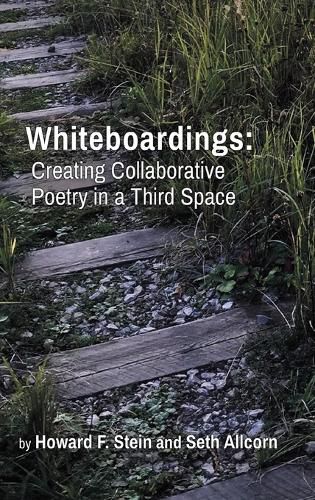Readings Newsletter
Become a Readings Member to make your shopping experience even easier.
Sign in or sign up for free!
You’re not far away from qualifying for FREE standard shipping within Australia
You’ve qualified for FREE standard shipping within Australia
The cart is loading…






This title is printed to order. This book may have been self-published. If so, we cannot guarantee the quality of the content. In the main most books will have gone through the editing process however some may not. We therefore suggest that you be aware of this before ordering this book. If in doubt check either the author or publisher’s details as we are unable to accept any returns unless they are faulty. Please contact us if you have any questions.
I had the pleasure of reading WHITEBOARDINGS, co-authored poetry by Howard F. Stein and Seth Allcorn, over the course of two days, in small bites, letting the poems digest as I entered into a third space between the writers and the words. The last line still rings: "what is real?" What seems real to me now, as the book still settles, is the depth of this third space, what [Donald] Winnicott once called "potential space"- which, unlike anything I've encountered, resounds with both wonder and longing in Stein and Allcorn's co-authored poems. Indeed, what seems little acknowledged, perhaps unconsciously avoided even, in the mountains of clinical writing on potential space, is just how creative a process of mourning can become when shared, through the free association of words, on a socalled "whiteboard." A process where the tragic can be at once refused, revisited, reimagined, and ultimately worked with, instead of merely "worked through." I'm also with a palpable feeling - like something "gone awry" after a summer's day of tubing down a river (see opening poem, "River of Snow"). The authors' words become my own as I ponder whether I can know the river's mysteries. Does it, can it, "flow upward" - an "upward spiral" away from all the "slaughter on the ground' - or is it all an "endless falling without a bottom"? I'm not sure of an answer - nor sure I want one - but I do recognize that the "casket was open" as I read (see "Life of Files"), and I saw what the authors saw there, unflinchingly, and I creatively mourned. But I also touched a strange and perhaps timeless beauty, if only for a brief moment, before the casket was closed and the corpse buried, burned, turned to ash. I had borne witness to the culmination of a sustained potential space, forged from a 30-year friendship between the two authors, that offered not just memories but promises back to us, its readers, in an enduring presence: a true gift. -Nathan Gerard, Ph.D.
$9.00 standard shipping within Australia
FREE standard shipping within Australia for orders over $100.00
Express & International shipping calculated at checkout
This title is printed to order. This book may have been self-published. If so, we cannot guarantee the quality of the content. In the main most books will have gone through the editing process however some may not. We therefore suggest that you be aware of this before ordering this book. If in doubt check either the author or publisher’s details as we are unable to accept any returns unless they are faulty. Please contact us if you have any questions.
I had the pleasure of reading WHITEBOARDINGS, co-authored poetry by Howard F. Stein and Seth Allcorn, over the course of two days, in small bites, letting the poems digest as I entered into a third space between the writers and the words. The last line still rings: "what is real?" What seems real to me now, as the book still settles, is the depth of this third space, what [Donald] Winnicott once called "potential space"- which, unlike anything I've encountered, resounds with both wonder and longing in Stein and Allcorn's co-authored poems. Indeed, what seems little acknowledged, perhaps unconsciously avoided even, in the mountains of clinical writing on potential space, is just how creative a process of mourning can become when shared, through the free association of words, on a socalled "whiteboard." A process where the tragic can be at once refused, revisited, reimagined, and ultimately worked with, instead of merely "worked through." I'm also with a palpable feeling - like something "gone awry" after a summer's day of tubing down a river (see opening poem, "River of Snow"). The authors' words become my own as I ponder whether I can know the river's mysteries. Does it, can it, "flow upward" - an "upward spiral" away from all the "slaughter on the ground' - or is it all an "endless falling without a bottom"? I'm not sure of an answer - nor sure I want one - but I do recognize that the "casket was open" as I read (see "Life of Files"), and I saw what the authors saw there, unflinchingly, and I creatively mourned. But I also touched a strange and perhaps timeless beauty, if only for a brief moment, before the casket was closed and the corpse buried, burned, turned to ash. I had borne witness to the culmination of a sustained potential space, forged from a 30-year friendship between the two authors, that offered not just memories but promises back to us, its readers, in an enduring presence: a true gift. -Nathan Gerard, Ph.D.